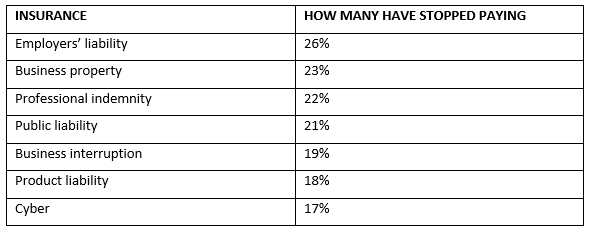- SMEs increasingly banking on credit for insurance
- Premium Credit Insurance Index will monitor insurance buying and how it is financed
More than half of SMEs have cut back on important insurance to reduce costs as the ongoing coronavirus crisis hits their balance sheets, new research(1) from the UK’s leading premium finance company, Premium Credit, shows.
Its study found 51% of small and medium-sized firms have stopped paying for a range of business insurance policies with employers’ liability insurance the most cut from a list including business property cover, professional indemnity and cyber.
Premium Credit’s Insurance Index research found nearly one in five (19%) of SMEs have stopped paying for business interruption insurance which has been the subject of disputes about claims being refused when firms were forced to shut by the UK’s national lockdown.
The Index, which aims to monitor insurance buying and how it is financed, found a growing reliance on credit to fund insurance with nearly two out of five firms (37%) borrowing to fund insurance premiums as a direct result of the pandemic. Most firms taking out extra credit are relying on credit cards with 64% using business cards and more than half (52%) of business owners using their personal cards to fund business insurance.
Premium Credit’s research found that SMEs and corporates that have used credit to pay for insurance are, on average, paying £1,670 more than 12 months previously.
Premium Credit is advising SMEs to consider premium finance which for a small charge enables them to pay monthly for cover instead of in a lump sum. Research for its Index shows SMEs using credit have suffered financially with 46% defaulting on interest or capital repayments in the past year while 54% worry they may default in the year ahead.
Owen Thomas, Chief Sales & Marketing Officer at Premium Credit said: “SMEs have had to battle to stay afloat during the pandemic which makes it understandable that they have cut back on insurance and taken out more credit. Necessary, often legal cover such as employer’s liability is likely being cut as firms reduce numbers of staff and wage rolls as a result of Covid-19. Cutting back on critical insurance can however be a mistake as not having the appropriate cover or being underinsured can be a serious risk for SMEs.”
“It is also worrying that so many SMEs are relying on their own credit cards or their business cards to pay for insurance. We would advise SME owners to speak to their insurance brokers for advice on how best to fund the appropriate level of cover for their business.”
Premium Credit research(2) in March this year before the pandemic found 63% of firms said paying for insurance is a high priority for them – that has now dropped to 59% in the most recent research conducted in August and September.
The SME research shows there are risks from being underinsured – 42% of SMEs say they have in the past five years suffered damage or losses they couldn’t claim for because of not being insured or being underinsured. Around 24% say they were underinsured while 18% say they didn’t have the appropriate insurance.
The table below shows the insurance that SMEs have stopped paying for since the onset of COVID-19.

Steve White, Chief Executive, British Insurance Brokers’ Association commented: “The Premium Credit Insurance Index outlines some worrying statistics. It’s vital that SMEs maintain insurance cover so they remain protected during these challenging times. Insurance brokers can help them choose suitable insurance and discuss premium finance should they want to spread the cost of their insurances.”
Notes to editors:
(1) Independent research conducted by Consumer Intelligence online among 156 SME owners and managers between August 20th and September 3rd 2020
(2) Independent research conducted by Consumer Intelligence online among 179 SME owners and managers between March 12th and 16th 2020
For further information please call Nick Andrews or Hugh Fasken at Citigate Dewe Rogerson on 0207 025 6435 or email nick.andrews@citigatedewerogerson.com
Click here to download the full report

